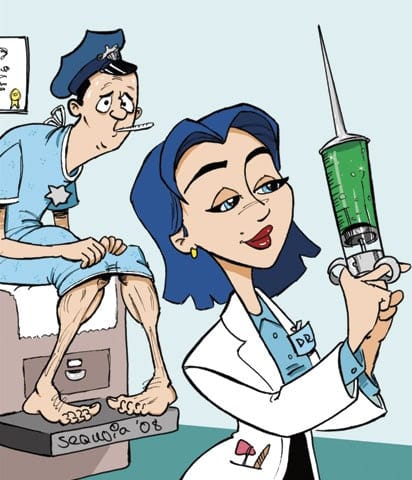Well, I just had my annual physical. I have reached that age where they check for just about everything but dementia, and my wife, the Sergeant, is wondering why they don't?
As I walked out of the office the nurse said a nice goodbye but I thought I saw a bit of a twinkle of humor in her eyes…sort of a "Well someone doesn't look so cocky now" kind of look, but that could have been my imagination.
Physicals are one of those things both men and women dread. But, except for that odd sense of violation we all get, we always feel tons better afterward as long as our chronic illnesses have stayed where they are.
In fact, President Eisenhower said the key to a long life was to get a chronic disease and treat it. If true, I should live a long time.
My message here is that each of you should be sure to get your physicals every year. I say that because it makes me sound wise and caring, but the truth is that misery loves company and if I have to get a physical you should have to too.
Honestly, we have a lot of things in life that are like physicals: We don't enjoy them but we need to do them. For the crime fighter the list includes things like depositions, evaluations, and death notifications. Each profession has a similar list of dreaded tasks that have to be performed. It just happens that some of the ones that we have to do are really tough.
I'll never forget my first death notification. In the academy they told us to contact the subject of the notification, verify their identification, and then ask them if they had anyone they could call to come over and call them. Then make sure they were the father, mother, son, whatever of the deceased and give them the news. This struck me as a little bit circuitous so I asked my dad, a physician and surgeon, how he gave bad news to patients or their family.
"Look" he said, "most people know it's damn serious if the person bringing you information is a doctor or a cop, and the only way to give it to them is straight and right away. Don't ask about calling someone or moving them around, just ask them if they are the right party and give them the news. The most important thing is what YOU do after you deliver the message. Never shoot from the lip then leave. Stay and show you give a damn!"
Dad had started his medical path in life as a Corpsman in the Navy and his time with the Marines in Korea had given him a rather salty vocabulary that he still exercises regularly.
My first death notification was to an elderly widow whose son had been killed in an accident back East. I remember thinking about what my Dad had said as I sat next to her holding her hand as she wept and waited for her minister to come over. It was hard to do, but it had to be done. I had chosen the other profession besides my father's that was consistently chosen to deliver these messages and his advice had served me well. She thanked me over and over as I left and she still clung to my hand.
There are always going to be tasks that we dread in our profession. Whether you have a death notification assigned to you today or a physical coming up next week, I guess the important thing to do is face them as unique little challenges in life. These are not the great confrontations and adventures that make life in law enforcement so exciting, but they are part of our profession. We should face them without hesitation and, in the case of helping others, we should take that special time to risk caring.













